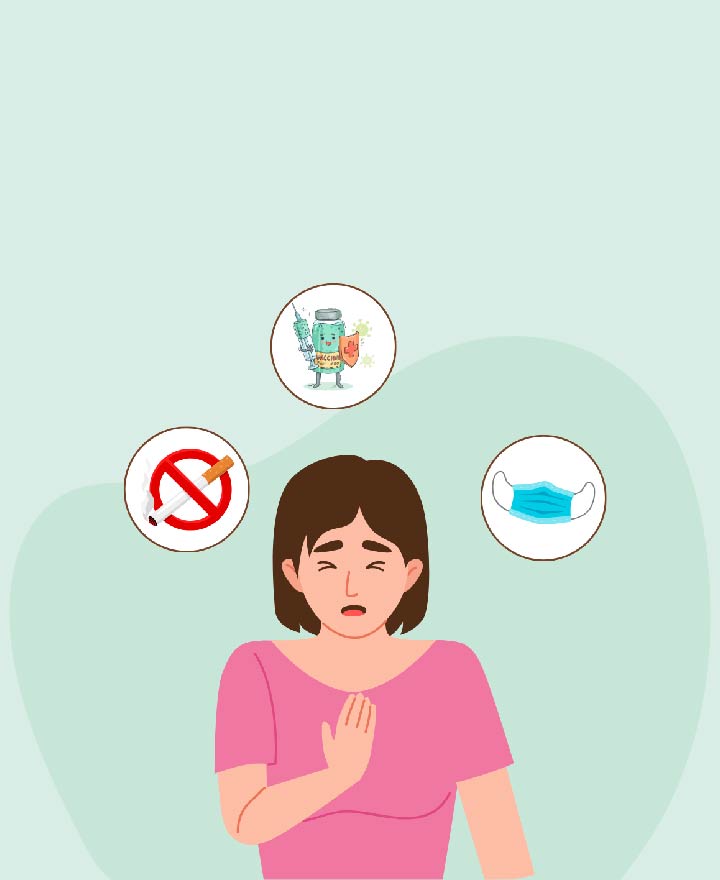

How to Treat COPD and How can it be Prevented?
Chronic obstructive pulmonary disease (COPD) is a chronic inflammatory lung disease that causes obstructed airflow from the lungs. Chronic obstructive pulmonary disease is quite common among individuals and often remains undiagnosed. Emphysema and chronic bronchitis are the two most common conditions that contribute to COPD. They usually occur together and can vary in severity among individuals with COPD.
The major symptoms of COPD include difficulty in breathing over time, wheezing, tightness in the chest, coughing, etc. While it cannot be completely cured, there are various treatment methods you can opt for to alleviate the symptoms & disease progression. Read on to know more.
How to Prevent COPD?
You can't heal the damage that has already happened in your lungs. But you can make changes to slow down the damage or stop it from getting worse.
● Quit smoking - This is the best way to prevent COPD or slow it down if you already have it.
● Avoid breathing in things that bother your lungs. As much as possible, stay away from fumes, toxins, secondhand smoke, and dust.
● Watch out for colds, viruses, and infections – If you have COPD, even a common cold can lead to severe problems.
● Get vaccinated – Get an annual flu vaccination and regular vaccination against pneumococcal pneumonia to reduce your risk of or prevent some infections.
● Get yourself tested for AAT deficiency - A blood test can find this type of COPD that you get from your parents at birth.
Complications
COPD can cause many complications, including:
• Respiratory infections -
People with COPD are more likely to catch colds, the flu and pneumonia which can make it much more difficult to breathe and could cause further damage to lung tissue.
• Heart problems -
COPD can increase your risk of heart disease, including heart attack.
• Lung cancer -
People with COPD have a higher risk of developing lung cancer.
• High blood pressure in lung arteries -
COPD may cause high blood pressure in the arteries that bring blood to your lungs causing pulmonary hypertension.
• Depression -
Difficulty breathing can keep you from doing activities that you enjoy which can contribute to development of depression.
How is COPD Diagnosed?
COPD is commonly misdiagnosed. Many people who have COPD may not be diagnosed until the disease is advanced. To diagnose your condition, your doctor will review your signs and symptoms, discuss your family and medical history, and discuss any exposure you've had to lung irritants — especially cigarette smoke. Your doctor may order several tests to diagnose your condition.
Tests may include:
1. Lung (pulmonary) function test
2. Chest X-ray
3. CT Scan
4. Arterial Blood Gas Analysis
How is COPD treated?
If you have COPD, your doctor may also consider the following treatment options:
• Medication –
Medicines such as bronchodilators relaxes the lung muscles thereby making breathing easier. Also, certain antibiotics and corticosteroids can help provide relief from symptoms such as coughing or wheezing.
• Pulmonary rehabilitation –
This is a personalized treatment program that teaches you how to manage your COPD symptoms to improve quality of life. Plans may include learning to breathe better, how to conserve your energy, and what types of food and exercise are right for you.
• Prevention and treatment of lung infections –
As lung infections can cause serious problems in people with COPD, certain vaccines, such as flu and pneumonia vaccines, are especially important for people with COPD. Respiratory infections should be treated with antibiotics, if appropriate.
• Supplemental oxygen –
A portable oxygen tank may be needed if blood oxygen levels are low.
• Surgery –
In the case of severe chronic obstructive pulmonary disease symptoms, doctors may recommend surgery like bullectomy, lung volume reduction surgery (LVRS), or lung transplant to enhance lung function.
Conclusion
You can significantly lower the risk of COPD by quitting smoking. Additionally, there are various effective treatment methods available to alleviate the symptoms and disease progression.
One of the important components of our overall wellness is also being financially secured. Healthcare emergencies can happen any time, but a good health insurance can protect you from such uncertain situations. To know more about it, click here
Source: Mayoclinic, EveryDayHealth
Disclaimer: This blog provides general information and discussions about health and related subjects. The information and other content provided in this blog, website or in any linked materials are not intended and should not be considered, or used as a substitute for, medical advice, diagnosis or treatment. Kindly contact your Doctor before starting a new medicine or health regime.
Related Articles
PTSD - risk factors and complications
What is CPR and how does it work?
Sudden Cardiac arrest - symptoms and causes
What you should know about lactose intolerance
Health consequences of iodine deficiency
Published on February 07, 2023

















 Health Insurance
Health Insurance  Travel Insurance
Travel Insurance  Car Insurance
Car Insurance  Cyber Insurance
Cyber Insurance  Critical Illness Insurance
Critical Illness Insurance
 Pet Insurance
Pet Insurance
 Bike/Two Wheeler Insurance
Bike/Two Wheeler Insurance  Home Insurance
Home Insurance  Third Party Vehicle Ins.
Third Party Vehicle Ins.  Tractor Insurance
Tractor Insurance  Goods Carrying Vehicle Ins.
Goods Carrying Vehicle Ins.  Passenger Carrying Vehicle Ins.
Passenger Carrying Vehicle Ins.  Compulsory Personal Accident Insurance
Compulsory Personal Accident Insurance  Travel Insurance
Travel Insurance  Rural
Rural